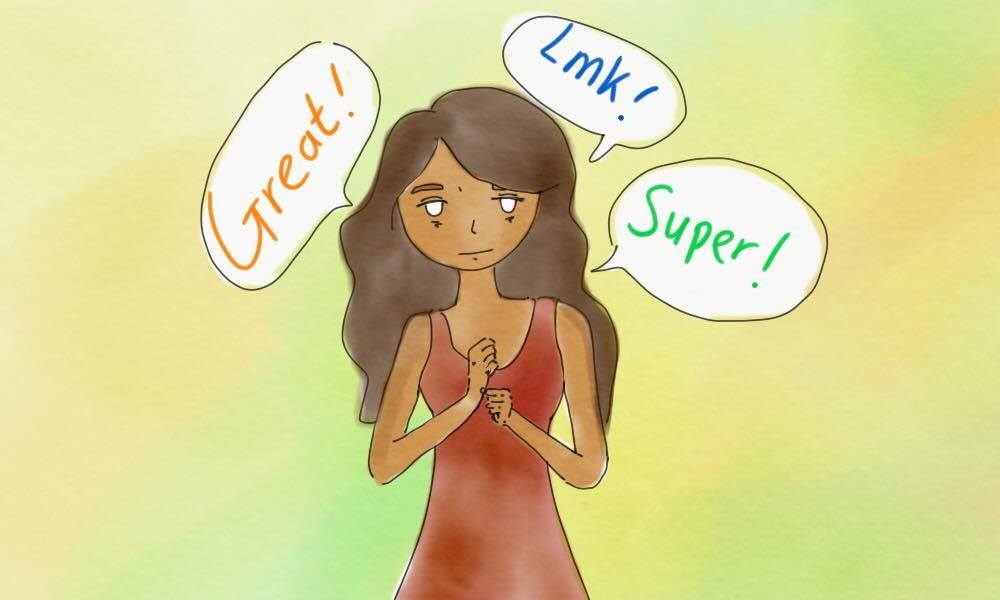
I’m not the sort of person who could be described as chill.
This is readily apparent to anyone who knows me. I’ve always been this way, a tight violin-string of a girl, vibrating with all sorts of opinions and undeservedly violent passions. I have a loud speaking voice, and enjoy friendly discussions that veer into the argumentative.
I never seemed to be able to care in the right way. Other people’s passions made them cool and unique, while mine always came out wrong — too loud, or incoherent.
I envied the sangfroid of others, people who seemed unperturbed and could take things in stride. I could never master blasé, but I longed to be one of those people who never really seemed to be bothered. I longed to be Chill.
If Chill wasn’t going to come naturally to me, I was going to have to try to attain it myself. I set out on a mission to will myself into Chill-dom through sheer force of will, but the harder I tried, the further away Chill seemed to get. Maybe, outwardly, I was fooling other people, but I certainly wasn’t fooling myself. There was nothing easy about this performative chillness. Instead of being a state of mind, a sort of zen-like way of living life free from conflict and demands, my Chill became a militant way of life, the constant subjugation of my own desires.
I had a litany of robotic phrases that I would parrot continuously. Everything that was “great!” “super!” and “Whatever you want, just let me know,” quickly shortened to “lmk!” to further illustrate how blasé I was. Exclamation points were an emphasis on exactly how chill I was. Like shouting, “See, I don’t care! I don’t care so much.” I sounded less like a fun, chill girl, and more like a human Siri. I never cared where a group I was in ate, or where and when we met. Chillness was translated into an erasure of my own desires and preferences. It was constant accommodation.
This is, of course, the sort of thing we do on a smaller scale every day. We all have opinions and preferences that get smothered, or tossed aside in deference to others. A certain amount of studied Chill is the backbone on which the majority of social interactions are built. But for me, chillness was more than the occasional tool or professional facade. Chillness became a virtue, wanting, and certainly expressing a want, became a tiny sign of failure.
Instead of freeing me from anxiety or awkwardness like I thought it would, Chill became a straightjacket that only served to make me more aware of how much I wanted and how much I cared. At first, the wall of chill fell when I was around my friends, but after so much practice and denial, it started creeping in among even those I was close to. The paradox of chill meant that the most routine feelings and needs became monumental breaches in my new code of conduct. Caring about these breaches meant that I was only further proving my inability to be chill.
Chill was not chill. It was exhausting. It made me feel jumpy and emotionally fried and crazier than when I started. One day I decided that I’d had enough. Chill was clearly not for me. I knew that under my studied ambivalence there was fear — fear of vulnerability, of exposure, of revealing my passion and sentiment for all the world to see and being disappointed. But after the suspended animation of Chill, fear and exposure felt bracing, exciting even.
And to my surprise, when I stopped putting a premium on being Super Chill all the time, I gradually started to find the sort of calm I had originally set out to find when I embarked on my journey to Chillness. After worrying for so long about caring, it was a relief to assert myself, even in the smallest of ways. Screw Chill, I absolutely do care where we eat.

REBECCA ALIFIMOFF is a College sophomore from Fort Wayne, Ind. studying history. Her email address is ralif@sas.upenn.edu.
The Daily Pennsylvanian is an independent, student-run newspaper. Please consider making a donation to support the coverage that shapes the University. Your generosity ensures a future of strong journalism at Penn.
Donate






